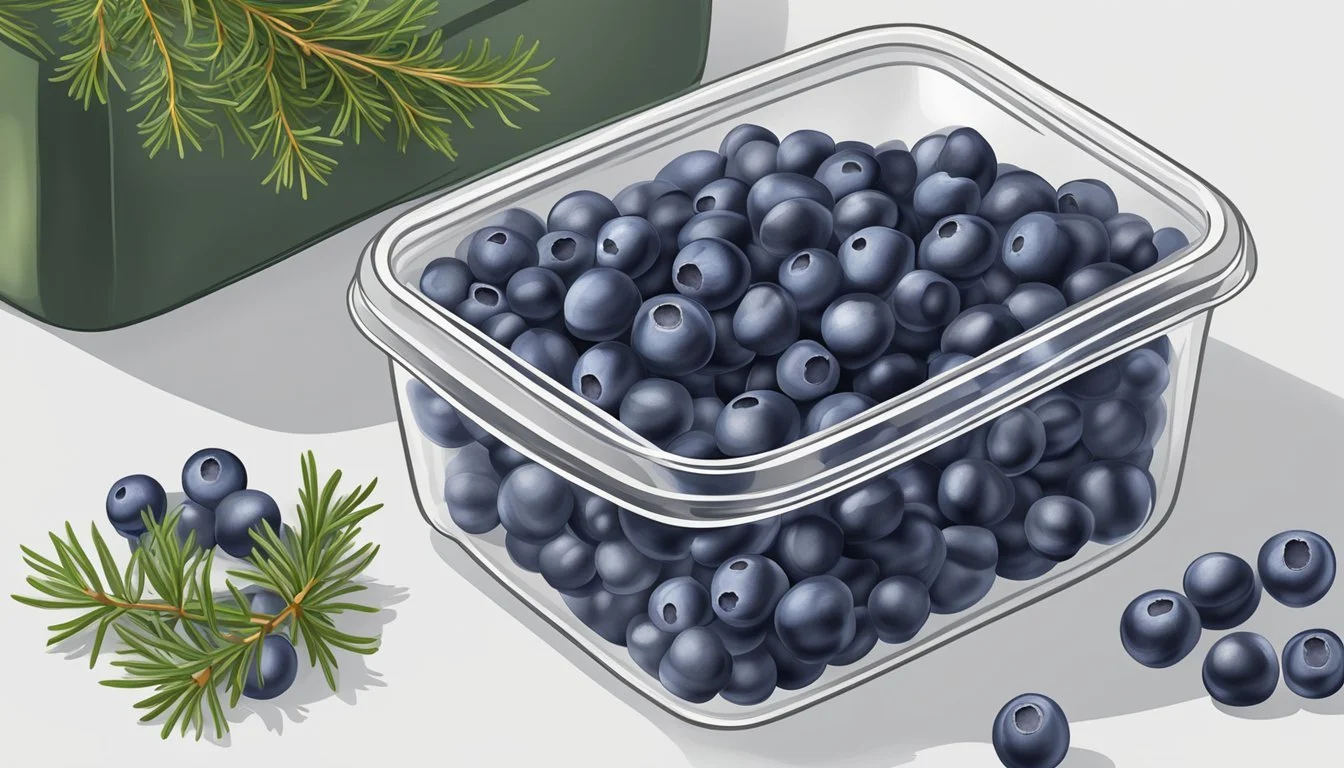Does Juniper Berries Go Bad?
Shelf Life and Storage Tips
Juniper berries, known for their aromatic and flavorful qualities, are not immune to spoilage. Fresh juniper berries can last for several months if stored properly, while dried juniper berries can maintain their quality for up to two years. Proper storage is key; at room temperature, fresh berries will only keep for about three days before they start to degrade.
Recognizing when juniper berries have gone bad is crucial for ensuring they are used when at their best. Signs of spoilage include a loss of aroma, changes in color, or the presence of mold. By understanding their shelf life and recognizing the indicators of bad juniper berries, one can optimize their use in both culinary and medicinal applications.
In addition to their shelf life, juniper berries offer numerous benefits, such as improving heart health, enhancing flavors in various dishes, and even playing a role in traditional beverages like gin. Their versatility and potential health benefits make it all the more important to store and use them correctly to maximize their efficacy and taste.
The Nature of Juniper Berries
Juniper berries, primarily from the Juniperus communis species, are distinct with their unique botanical characteristics, culinary applications, and rich historical significance. Found across Northern Europe and North America, these berries have multifaceted uses and possess various varieties.
Identification and Biological Characteristics
Juniper berries are not true berries but modified seed cones of the juniper tree. Predominantly from the Juniperus communis species, they display a blue or purple hue when ripe. These small, spherical cones house several hard seeds within.
Juniper trees are evergreen and can grow as shrubs or tall trees, depending on the species. The leaves are needle-like, sharp, and arranged in whorls. Female seed cones bear the berries, which mature over one to three years depending on the climate and species.
Culinary Uses and Flavor Profile
Primarily used as a spice, juniper berries offer a unique, pine-like flavor with hints of citrus and pepper. They are crucial in flavoring gin, providing the beverage’s signature taste. In cooking, these berries are often used to season meats like pork, beef, and game, enhancing dishes with their aromatic properties.
Whole or ground, juniper berries can be found in the spice aisles of many grocery stores. Their versatility extends to stews, soups, and marinades. Ripe berries are preferred for their optimal flavor, while the immature ones can taste bitter and overly resinous.
Historical Significance and Traditional Medicine
Historically, juniper berries have held significant roles in various cultures. In ancient Rome and Greece, they were used for their purported medicinal properties. People believed juniper berries could aid digestion, prevent infections, and even serve as a diuretic.
In Europe and North America, indigenous populations utilized the berries in traditional medicine to treat ailments ranging from coughs to skin irritations. The berries have also been used in rituals and as natural preservatives due to their antimicrobial properties.
Varieties and Distribution
There are numerous species of juniper, each producing berries with slight variations in flavor and appearance. Juniperus sabina, for example, is known for its toxic properties and is not typically used for culinary purposes. Juniperus communis is the most common and widely utilized species for berries.
Juniper species are well-adapted to a range of environments, from the arid regions of North America to the temperate forests of Northern Europe. These trees are hardy and can thrive in poor soils, often found on rocky hillsides and in mountainous regions.
Juniper berries, with their broad geographic distribution, play a significant part in the ecosystems they inhabit, offering food for wildlife and contributing to biodiversity.
Quality and Freshness Indicators
Understanding the quality and freshness of juniper berries is crucial to ensure their optimal use in both culinary and medicinal applications. Key indicators include ripeness at harvest, color changes, texture, and aroma.
Ripeness and Harvesting
Juniper berries should be harvested when they display a rich, bluish-black color, indicating full ripeness. Unripe berries, which are usually green, lack the desired aroma and flavor. Harvesting is best done in the fall, when most berries have matured. It is advisable to select ripe berries to avoid bitterness. To protect the berries from birds, using bird netting is recommended.
Freshness and Color
Fresh juniper berries have a distinct bluish-black hue. Over time, they may turn yellow or pale, signaling a loss of quality. It's essential to avoid berries with dark patches or visible mold. These signs indicate spoilage and compromised freshness. Consistent color is a reliable indicator of fresh, high-quality berries.
Texture and Aroma
The texture of juniper berries should be firm, whether fresh or dried. Soft, mushy berries are likely spoiled. Fresh berries give off a strong, pine-like aroma, which diminishes as they age. A noticeable change in smell, such as a musty or off odor, is a clear sign of decay. Regularly checking the texture and aroma helps in maintaining the quality of stored berries.
Health Benefits and Nutritional Value
Juniper berries are prized for their medicinal properties and rich nutritional content. They contain various bioactive compounds that offer significant health benefits, making them valuable in traditional and modern medicine.
Medicinal Properties and Uses
Juniper berries have been used for centuries for their diuretic, anti-inflammatory, and antifungal properties.
They help reduce inflammation, which can alleviate symptoms of arthritis. Additionally, the berries are known to support urinary health by acting as a natural diuretic, promoting healthy bladder and kidney function.
They're also employed in combating fungal infections due to their potent antifungal traits. These medicinal qualities make juniper berries a versatile addition to natural remedies.
Vitamins, Antioxidants, and Bioactive Compounds
Rich in vitamin C, juniper berries boost the immune system and enhance skin health.
They contain flavonoid antioxidants that protect cells from damage by neutralizing free radicals. Bioactive compounds like monoterpenes and coumarins contribute to their antioxidant and anti-inflammatory effects.
These components also help in managing blood sugar levels and potentially protecting against chronic diseases, highlighting the berries' nutritional and therapeutic value.
Research on Juniper Berries and Health
Studies indicate that juniper berries have significant anticancer properties, helping to inhibit the growth of certain cancer cells.
Research also supports their role in reducing oxidative stress, which is linked to several diseases. Their impact on heart health is noted, with potential benefits in lowering blood pressure and cholesterol levels.
Furthermore, ongoing studies are exploring their antidiabetic effects, showing promise in blood sugar regulation. The extensive research underscores the importance of juniper berries in promoting overall health.
Storing Juniper Berries Correctly
Proper storage of juniper berries ensures their longevity and quality, whether they are fresh or dried. Key factors include using suitable containers, maintaining the right environment, and understanding the differences in storage techniques for dry and fresh berries.
Appropriate Containers and Environments
Using the right containers is crucial for storing juniper berries. Airtight containers are ideal for dried juniper berries to keep out moisture and air, preserving their flavor and aroma. Glass jars with tight-sealing lids are commonly used.
To protect the berries from light damage, which can degrade their quality, containers should be stored away from direct sunlight. A cool, dark place like a pantry or cupboard is best for maintaining optimal conditions.
Dry Versus Fresh Storage Techniques
Storage methods differ between dry and fresh juniper berries. Fresh berries have a much shorter shelf life and should be kept in the refrigerator. They can last for several days up to a few weeks if stored in a vented container to allow airflow and reduce moisture buildup.
Dried juniper berries, on the other hand, are more stable. Storing them in an airtight container in a dry environment will help them retain their qualities for up to two to three years. Avoid storing dried berries in areas prone to high humidity to prevent them from absorbing moisture.
Shelf Life Considerations
The shelf life of juniper berries varies significantly based on how well they are stored. Fresh berries kept in a cool, dry place can be viable for a few weeks. Dry berries can maintain quality for upwards of two years if stored properly.
Inadequate storage conditions, such as exposure to heat, humidity, or light, can significantly shorten the shelf life of both fresh and dried berries. Always inspect the berries for signs of spoilage, such as discoloration or loss of aroma, before use to ensure they are still good.
Recognizing Spoilage and Preservation Methods
Juniper berries can be long-lasting when stored correctly, but they are also susceptible to spoilage that can compromise their quality and safety. Understanding the signs of spoilage and employing effective preservation techniques is essential.
Signs of Deterioration
Identifying spoilage in juniper berries involves examining their appearance, texture, and aroma.
Visual indicators of spoilage include the presence of mold, noticeable color changes, or shriveled skin.
Tactile examination can reveal if berries have become overly hard or mushy, suggesting they are no longer fresh.
Smelling the berries is also crucial; a sour or off odor indicates deterioration. Always err on the side of caution and discard any berries with these signs.
Extending Freshness through Proper Care
Proper storage techniques can significantly extend the shelf life of juniper berries.
Fresh Berries: Keep fresh juniper berries in the refrigerator, ideally in a breathable container like a paper bag to maintain optimal humidity and prevent moisture buildup, which can cause mold growth.
Dried Berries: Store dried juniper berries in an airtight container in a cool, dark place. This method prevents exposure to light and air, which can degrade the berries' quality over time.
Freezing: Another option is to freeze the berries, which can preserve their aromatic properties for a longer period.
Hazards of Consuming Spoiled Berries
Consuming spoiled juniper berries poses several health risks.
Mold Infestation: Eating moldy berries can cause allergic reactions or food poisoning symptoms such as nausea and vomiting.
Toxins: Spoiled berries might harbor toxins produced by mold, increasing the risk of toxicity if ingested.
Natural Remedies: While juniper berries are sometimes used for natural remedies, using spoiled berries nullifies their effects and can introduce harmful substances to the body. Always ensure berries are fresh and properly preserved before use.
By being vigilant about spoilage signs and adopting proper storage techniques, one can enjoy the benefits of juniper berries safely.
Culinary Applications and Preparation
Juniper berries bring a distinctive piney and citrus-like flavor to various dishes. They can be utilized in both savory and sweet recipes, offering versatility in culinary creativity.
Infusing Flavors into Food and Drink
Juniper berries are often used for flavoring alcoholic beverages, notably gin. They impart a unique aromatic profile that enhances the drink. For non-alcoholic options, they can be steeped to make a fragrant tea.
In cooking, juniper berries can be crushed and added to stocks or broths to infuse them with a peppery and slightly bitter flavor. They are also excellent in pickling brines, adding complexity to preserved vegetables.
Juniper Berries in Meat Dishes and Marinades
Rubbed into meats like venison, juniper berries offer a robust, woodsy flavor that pairs well with rich game. They can be crushed and mixed with other spices, garlic, or ginger to create a savory rub.
Stewing juniper berries before using them in a marinade or basting liquid helps to mellow their sharpness. When used in long, slow-cooked dishes, they impart a subtle but distinctive taste.
Creative Uses in Desserts and Sauces
In desserts, juniper berries add an unexpected depth. They work well with fruits like apples or pears, introducing a peppery nuance to pies and crumbles. In sauces, they can be used to create inventive combinations, especially in chutneys and compotes.
For a unique twist on classic recipes, juniper-infused sorbets or ice creams can provide a refreshing yet complex flavor profile. They can also be used in syrups or drizzles for cakes and pastries, balancing sweetness with their aromatic essence.








